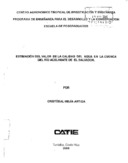Estimación del valor de la calidad del agua en la cuenca del río Acelhuate de El Salvador

View/
Date
2000Author
Mejía Artiga, Cristóbal
Type
Tesis de maestría
Metadata
Show full item recordAlternative title
Estimation of the value of the quality of water of the basin of the Acelhuate river in El Salvador
Description
Tesis (M. Sc) -- CATIE, Turrialba (Costa Rica), 2000 114 p. + (anexos 23 p.) 10 fig. 22 tab Referencias 109- 113
Abstract
El presente estudio busca contribuir a la toma de decisiones y al diseño de políticas para el manejo eficiente de los recursos hídricos en El Salvador, mediante la estimación del valor económico de la calidad del agua a través de la voluntad a pagar por sistemas de tratamientos para aguas servidas en la cuenca del Río Acelhuate. La metodología utilizó grupos focales que permitieron conocer e identificar mejor la problemática actual, aspectos legales e institucionales, y nuevas variables que pudiesen incluirse en la encuesta. Se utilizó el Método de Valoración Contingente (MVC) mediante la aplicación de una encuesta personal, para determinar la voluntad de pago (VDP) de la población del Municipio de Guazapa, para el establecimiento de plantas de tratamiento de aguas servidas. En la metodología se aplicó el método dicotómico simple (Single Bounded), para la primer ronda de respuestas y un dicotómico doble (Double Bounded), para la primera y segunda ronda. Una prueba de rango (scope), para conocer el valor que otorgan las personas a los cambios en su bienestar al mejorar la calidad del agua del río Acelhuate. Se espera que estudios como este sean de interés y contribuyan para la planificación, elaboración y ejecución de políticas en el manejo sostenible del recurso hídrico en la Cuenca del Río Acelhuate. The present study striver to assem to the economic value of the quality of water through willingness-to-pay for wastewater treatment systeMON in the Acelhuate River. Thus the present study may contribute to decision making and environmental policy development for the efficient management of water supplies in El Salvador. The methodology used focal groups to improve the identification and assemment of the polution problem, legal and institutional aspects, and new variables that could be included in the survey. The Contingent Valuation Method (CVM) was used through personal interviews to determine willingness-to-pay (WTP) of the population of the municipality of Guazapa for the establishment of wastewater treatment plants. The single bounded method was applied in the first round of answers and the double bounded method to second round. A proof of scope was used to ascertain the value that people would give to changes in their welfare as the quality of water of the Acelhuate River would improve. Our hope is that this study may be of interest and may contribute to planning, elaboration and implementation of sustainable management policies for water supplies in the Acelhuate river basin.
Keywords
WATER QUALITY, WATER MANAGEMENT, WATER POLLUTION, VALUATION, WATER RESOURCES, POLLUTION CONTROL, RESOURCE CONSERVATION, ECONOMIC VALUECALIDAD DEL AGUA, ORDENACION DE AGUAS, POLUCION DEL AGUA, ESTIMACION, COSTOS RECURSOS HIDRICOS, CONTROL DE LA CONTAMINACION, CONSERVACION DE LOS RECURSOS, VALOR ECONOMICO, EL SALVADOR, TRATAMIENTO DE AGUAS,
Asesor
Hearne, Roberto
Publisher
CATIE, Turrialba (Costa Rica)
URI (Permanet link to cite or share this item)
https://repositorio.catie.ac.cr/handle/11554/4973Collections
- Tesis [3115]

